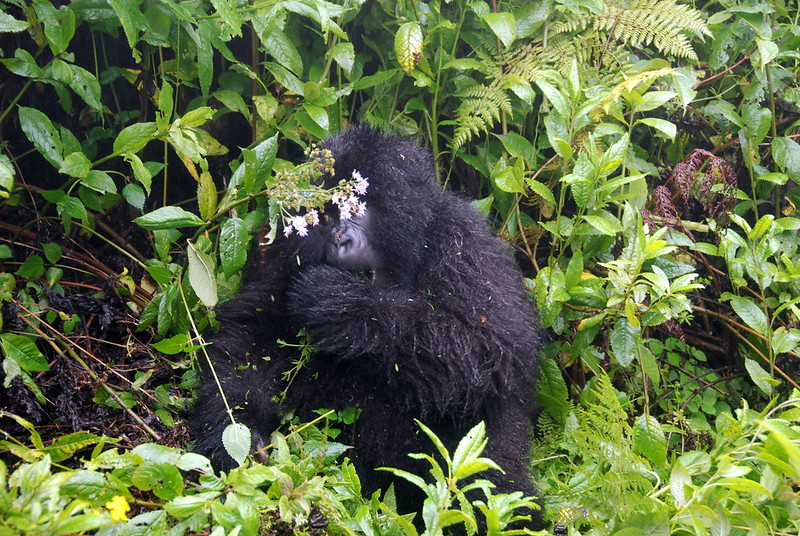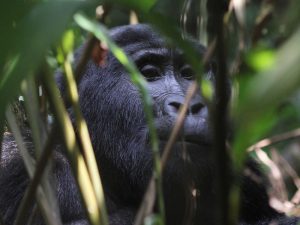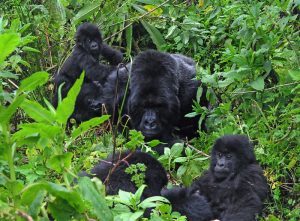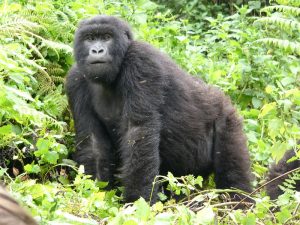facts about mountain gorillas.
Journey into the heart of Africa’s wilderness as Abunda Discoveries Uganda invites you to discover the mesmerizing world of mountain gorillas. These majestic creatures, residing in the dense forests of East Africa, captivate the hearts of adventurers and conservationists alike. Join us on a virtual safari through the rich tapestry of facts that paint a vivid portrait of the incredible mountain gorillas.
Habitat and Range: The Virunga Massif and Bwindi Impenetrable Forest:
Mountain gorillas, a subspecies of the eastern gorilla, find their sanctuary in the Virunga Massif—a volcanic mountain range spanning Rwanda, Uganda, and the Democratic Republic of Congo—and Bwindi Impenetrable Forest in Uganda. Their habitat is a mosaic of dense bamboo forests, montane vegetation, and lush greenery.
Endangered Status: A Critical Conservation Focus:
Mountain gorillas are classified as endangered, with only around 1,000 individuals remaining in the wild. Conservation efforts, including those by Abunda Discoveries Uganda, play a pivotal role in ensuring the survival of these iconic primates.
Social Structure: The Gorilla Family Unit:
Mountain gorillas live in close-knit family groups led by a dominant silverback—the mature male with silver-gray hair on its back. The family structure also includes females, infants, and juveniles, creating a tight bond that fosters cooperation and protection.
Vegetarian Diet: A Feast of Foliage and Fruits:
Gorillas are primarily herbivores, consuming a diet rich in foliage, fruits, and plants. Their strong, robust jaws and teeth are adapted to the challenges of breaking down tough vegetation, sustaining them in their mountainous habitats.
Communication: Grunts, Roars, and Expressive Gestures:
Mountain gorillas communicate through a variety of vocalizations, including grunts, roars, and barks. Additionally, they use body language, facial expressions, and gestures to convey emotions, establish dominance, or maintain social harmony within the family.
Gentle Giants: Despite Their Size, Gorillas Are Non-Aggressive:
Despite their formidable size, mountain gorillas are known as gentle giants. They are generally non-aggressive, with interactions within the family characterized by mutual grooming, playing, and occasional displays of strength to assert dominance.
Endearing Gestures: Gorilla Hugging and Expressing Affection:
Gorillas display remarkable affectionate gestures within their family units. Hugging, grooming, and even sharing tender moments between mothers and infants are common, showcasing the deep emotional bonds that characterize their social dynamics.
Threats to Gorilla Conservation: Poaching and Habitat Loss:
Mountain gorillas face threats such as poaching, habitat loss, and political instability in their native regions. Conservation initiatives, including responsible tourism promoted by us, play a crucial role in addressing these challenges and ensuring a sustainable future for the gorillas.
Gorilla Trekking: A Responsible Adventure:
Gorilla trekking, a unique and awe-inspiring experience, allows visitors to witness these incredible creatures in their natural habitat. Abunda Discoveries Uganda emphasizes responsible tourism practices to minimize impact and contribute to the conservation of mountain gorillas.
Success Stories: Conservation Efforts Making a Difference:
The collaborative efforts of conservation organizations, local communities, and responsible tourism initiatives are yielding positive results. Success stories highlight increasing gorilla populations, demonstrating that concerted efforts can make a significant impact on their conservation.
Conclusion:
Guardians of the Mountains:
As guardians of the mountains, mountain gorillas embody the resilience of nature and the importance of conservation. Abunda Discoveries Uganda invites you to appreciate the beauty, complexity, and fragility of their existence—a testament to the delicate balance between humans and the incredible wildlife that graces the Virunga Massif and Bwindi Impenetrable Forest.




